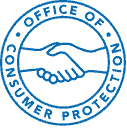Mortgages
Mortgages are loans that use your home as collateral. There are different kinds of mortgages, but all are major financial commitments. We have information on some of the variations below.Standard Mortgage
Purchasing a home is one of the largest monetary transactions that most Americans make, and yet many do so without a clear understanding of what is involved in the home buying process.
Here in Montgomery County, many free classes are available to help home buyers gain a better understanding of the process involved in purchasing a home. One such class is offered by Housing & Community Initiatives, Inc. (HCI), a nonprofit whose mission is "to enable low and moderate income households to achieve their homeownership goals by providing education -- the first step to housing success." HCI offers a 3-hour introductory class for anyone looking to purchase their first home. Additional resources include the Federal Trade Commission’s “ Loans and Mortgages ” pages and the Consumer Tools provided by the Consumer Financial Protection Bureau.
Choosing a mortgage or a home equity line of credit can be confusing for consumers. The first step is to check your credit report and score. The amount of interest you will pay will be based on your credit score and information in your credit report. The lower your credit score is, the higher interest rate you will be charged.
- If there are errors on your credit report, get these taken care of and removed prior to applying for a loan.
- If there are legitimate problems with your credit, i.e., you've paid payments late or have a high amount of debt, take the time to raise your credit score by paying bills on time for several months or reduce your debt before applying for a loan. Doing this could save you thousands of dollars over the life of the loan.
COVID-19 Resources
There is help available for many homeowners. However, if you can pay your mortgage, you should do so. You should only contact your mortgage company of you cannot pay your mortgage. The Consumer Financial Protection Bureau has information on mortgage relief options . The Maryland Department of Labor’s Financial Regulation Office has additional information on mortgage relief options.
| Resources | Description of Help Provided |
|---|---|
| Federal Trade Commission's (FTC) Free Annual Credit Reports |
Obtaining your credit report |
|
U.S. Department of Housing & Urban Development (HUD)
http://portal.hud.gov/hudportal/HUD?src=/topics/buying_a_home MoneyWise: You Can Buy A Home
|
Advice for buying a home. |
| U.S. Department of Housing & Urban Development (HUD) http://www.hud.gov/offices/hsg/sfh/hcc/hcs.cfm?webListAction=search&searchstate=MD |
Finding a HUD approved Housing Counselor in MD |
| Maryland Office of the Commissioner of Financial Regulation T: 410.230.6100 or 888.784.0136 http://www.dllr.state.md.us/finance/index.shtml |
Information on lenders, mortgage originators, and financial institutions in Maryland. |
|
Federal Trade Commission: "Loans & Mortgages"
Federal Deposit Insurance Corporation's: " Looking for the Best Mortgage" Federal Reserve Board: " Consumer Information" MoneyWise: Keeping Your Home
|
Advice on choosing a mortgage, home equity line of credit; what to do if you are having problems paying your mortgage; and more. |
| Maryland Office of the Attorney General https://www.marylandattorneygeneral.gov/Pages/CPD/foreclose.aspx |
Advice on foreclosures |
| Montgomery County Office of Consumer Protection https://www.montgomerycountymd.gov/ocp/a_z/home_ownership/foreclosure.html |
Advice on foreclosures and mortgage relief scams. |
Reverse Mortgage
Reverse mortgages are products available to those 62 or older in which the lender pays you. If you have equity in your home, you may be able to borrow against it. When you die, sell your home, or no longer live in the home, the loan must be repaid.There are three kinds of reverse mortgages:
Home Equity Conversion Mortgages (HECMs)
- Most common
- Federally insured through the U.S. Department of Housing and Urban Development (HUD)
- Can be used for any purpose
- Private loans
- Offered by state and local government agencies and non-profits
- Lender specifies what the loan can be used for
- Least expensive
Things to consider :
- Fees and other costs
- HECMs and proprietary reverse mortgages are more expensive than traditional loans and can have high upfront costs
- Interest is added over time, so the balance owed grows
- Interest rate is usually variable, so it is subject to change
- Interest is not deductible
- Still have to pay taxes, insurance, maintenance and other expenses
- How your spouse will be affected
- Leaves fewer assets for your heirs
- Must think about what you need the money for, as some loans will limit use of the proceeds
U.S. Department of Housing and Urban Development
https://www.hud.gov/program_offices/housing/sfh/hecm/hecmhome
Federal Trade Commission
https://www.consumer.ftc.gov/articles/0192-reverse-mortgages
Consumer Financial Protection Bureau
Reverse Mortgage Tools & Resources: https://www.consumerfinance.gov/consumer-tools/reverse-mortgages/
You have a reverse mortgage: Know your rights and responsibilities: Booklet
